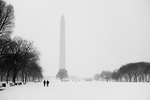The U.S. Tax Court gave a taxpayer extra time to file a petition after a winter storm forced the closure one day last year of all federal offices, including the Tax Court.

A taxpayer’s petition in a collection due process case must be filed within the 30-day period prescribed by Code section 6330(d). In Guralnik v. Commissioner, 146 T.C. No. 15 (June 2, 2016), the Tax Court determined last week that the petition was timely filed, giving it jurisdiction to hear the case since the Clerk’s Office was closed on the last day for filing due to a winter storm, and the petition was filed on the next day when it reopened.
On Feb. 13, 2015, Felix Guralnik sent his petition to the Tax Court via Federal Express First Overnight which was not then a “designated delivery service” under Code section 7502(f)(2).
On the last day for timely filing of the petition, Tuesday, Feb. 17, 2015, all federal government offices in the District of Columbia, including the Tax Court, were officially closed due to Winter Storm Octavia. As a result, Guralnik’s petition was not delivered to the court until the next day, Wednesday, Feb. 18, 2015, when the court reopened.
The Federal Rules of Civil Procedure provide that if the clerk’s office is inaccessible on the last day for filing, then the time is extended to the first accessible day that is not a Saturday, Sunday or legal holiday. Although the Tax Court Rules do not address how to compute time when the clerk’s office is inaccessible, Rule 1(b) provides that the court or judge “before whom the matter is pending may prescribe the procedure, giving particular weight to the Federal Rules of Civil Procedure to the extent that they are suitably adaptable to govern the matter at hand.”
The “timely mailed, timely filed” rule of Code section 7502(f) was not available to Guralnik, since Federal Express First Overnight service was not an approved private delivery service as of the date on which his petition was filed.
However, in the absence of a Tax Court Rule prescribing the procedure when the Clerk’s Office is inaccessible, the court said the principles of Federal Rules of Civil Procedure are “suitably adaptable to govern the matter at hand.” And since Gurlanik’s petition was filed on the first accessible day that was not a Saturday, Sunday or legal holiday, it was timely filed and the court has jurisdiction to hear the case.